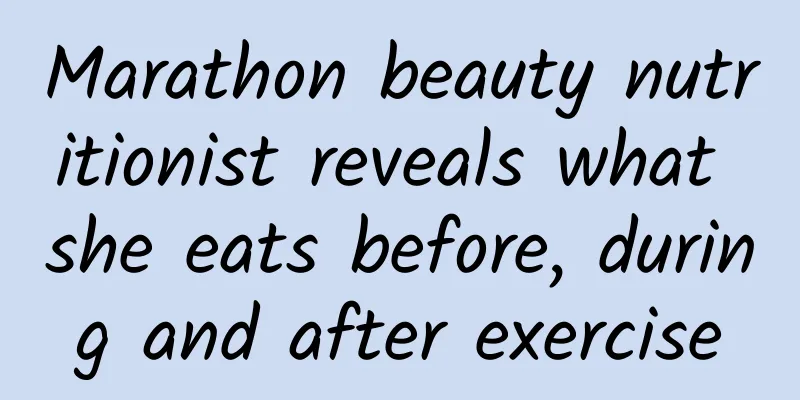Marathon beauty nutritionist reveals what she eats before, during and after exercise

|
You have to eat right when exercising to be healthy. So how should you eat before, during, and after exercise to achieve the best results? Nutritionists say that you must eat carbohydrates before exercise to quickly provide the energy needed for exercise; during exercise, focus on water and electrolyte intake; after exercise, supplementing with some carbohydrates and protein foods can help repair muscles, promote metabolism, and make muscle tissue bigger and stronger. Nutritionist Zhang Peirong said that exercise is the best medicine, but if you ignore diet and water intake before, during and after exercise, you may become dehydrated or cause low blood sugar. In severe cases, you may faint. Instead of strengthening your body, you may cause harm to it. If you want to exercise healthily and safely, here are some dietary recommendations before, during, and after exercise: Pre-exercise diet: carbohydrates, moderate protein, low fat If you exercise right after a meal, gastrointestinal discomfort is likely to occur. It is generally recommended to wait 3 to 5 hours after a meal, when the food is almost digested and the body has sufficient energy, which is the best time to exercise. The recommended diet before exercise is a combination of high-carbohydrate, moderate-protein, and low-fat foods, plus 350 cc to 500 cc of boiled water. Carbohydrate foods such as noodles, rice, potatoes, sweet potatoes, etc. are easily converted into glycogen for storage in the body. Therefore, you must eat carbohydrates before exercise to quickly provide the energy needed for exercise. High-fat foods take a long time to be digested and absorbed by the body, so it is not recommended to eat them before exercise. In addition, if people want to develop a habit of morning jogging, after 6 to 8 hours of sleep at night, the body is in an empty stomach state. If they get up early in the morning without replenishing energy, exercising in an energy-deficient state will not only affect the effect of exercise, but they may also be prone to symptoms such as general weakness, cold sweats, dizziness, etc., and even more dangerously, hypoglycemia may occur. It is recommended to eat some foods containing carbohydrates, such as 1 banana, 1 dinner roll, steamed bun or 1 cup of oatmeal before morning jogging as a source of energy for exercise. Diet during exercise: drink plenty of water and electrolytes Nutritionist Zhang Peirong recommends that if the exercise time is less than 1 hour, you can replenish about 200cc to 300cc of water every 10 to 15 minutes. If the exercise time exceeds 1 hour, a large amount of electrolytes will be lost with sweat. If not properly replenished, it may lead to electrolyte imbalance and prone to problems such as cramps. It is recommended that in addition to replenishing water, you should also replenish electrolytes. You can drink some sports drinks, lemon slices dipped in salt or plum powder, or eat salt tablets or salt candies. In addition, if the exercise time is long and the intensity is high, it is recommended to supplement an appropriate amount of easily digestible carbohydrates, such as bananas, biscuits, etc. every half hour. This can enhance endurance and prevent hypoglycemia and hunger. However, it is recommended not to eat too much each time to avoid gastrointestinal discomfort and nausea during exercise. Post-exercise diet: protein + carbohydrates to help build muscle Nutritionist Zhang Peirong pointed out that supplementing food within 1 hour after exercise will not only not make you fat, but it is also the best time to absorb nutrients. Muscle fibers will be damaged after exercise. Supplementing carbohydrates, protein and water can repair muscles, promote metabolism, and make muscle tissue bigger and stronger. It should be noted that protein needs to be consumed with sufficient carbohydrates, because muscles need sufficient carbohydrates to function during the process of generation, metabolism and repair. If carbohydrates are not supplemented enough, excess protein will not be able to help muscle synthesis. It is recommended to eat foods composed of carbohydrates and protein in a ratio of 3 to 4:1 after exercise, such as 1 triangular rice ball + tea egg, banana + soy milk, sweet potato + milk, etc., to provide sufficient nutrients to the muscles. |
>>: Eat right before and after exercise! Doctor of Nutrition reveals recommended menu
Recommend
Postpartum body shaping is not a dream. Hollywood actresses have tricks
After giving birth, many women, in addition to en...
What are the factors that cause threatened miscarriage?
What are the factors that lead to threatened abor...
How much does it cost to completely cure chocolate cyst?
How much does it cost to completely cure chocolat...
Symptoms of ectopic pregnancy
The symptoms of ectopic pregnancy should be paid ...
Can kiwi cause miscarriage? What are the side effects of eating kiwi during pregnancy?
Whether kiwi fruit can cause miscarriage needs to...
Will cervicitis affect fertility? How should women who are diagnosed with cervicitis be treated?
The female uterus is an important reproductive or...
Are you using the right method to lose weight? 4 key points to increase basal metabolism
People who have tried to lose weight, especially ...
Can I eat fruit during medical abortion? Avoid eating fruit with cold properties
Women can eat fruits during the period of medical...
What are the harmful effects of uterine fibroids?
Among gynecological diseases, uterine fibroids is...
What causes dysmenorrhea that women should know
In real life, many female friends feel abdominal ...
What are the specific measures to prevent cervical hypertrophy?
The occurrence of gynecological diseases is very ...
Edema makes you look fat! Eat 10 foods to detoxify and reduce swelling
[Key Points]: When toxins accumulate in the human...
Vivian Hsu lost her belly fat by giving up beef, is it healthy? Nutritionist says...
Vivian Hsu (Vivian), who has been in the industry...
Coconut water is not only refreshing, but also thirst-quenching. Here are 10 unexpected benefits of coconut water you must know!
As the temperature keeps rising in the summer, a ...
Don’t worry about gaining weight in middle age! Lose weight correctly to restore your slim waist
After women enter menopause, their metabolism gra...









